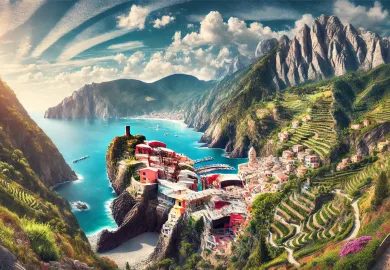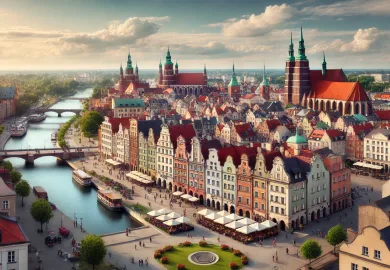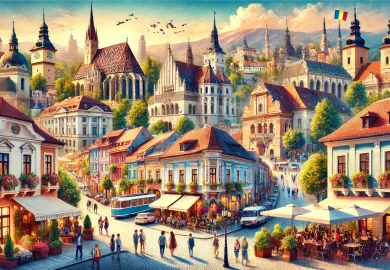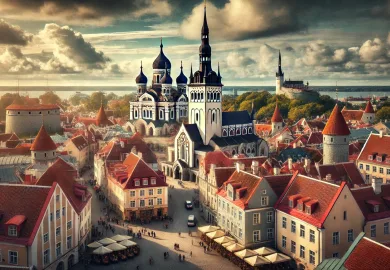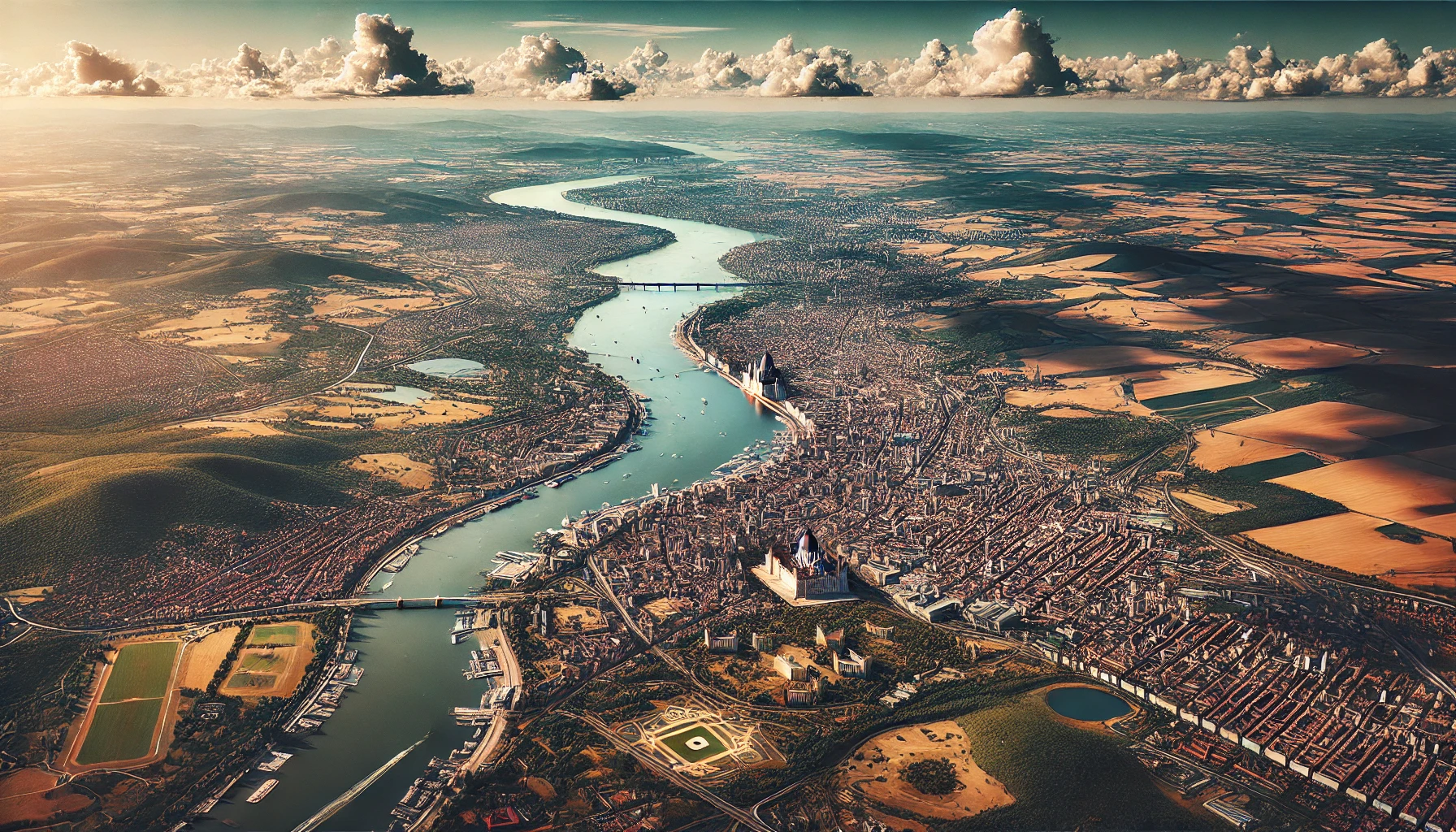
Disclaimer: This content was generated using AI. While I strive for accuracy, I encourage readers to verify important information. I use AI-generated content to increase efficiencies and to provide certain insights, but it may not reflect human expertise or opinions.
Hungary, a land of thermal baths, ancient castles, and vibrant culture, offers travelers a unique blend of the old and the new. Whether you’re wandering through the cobblestone streets of Budapest or exploring the scenic landscapes of the countryside, Hungary is a country where tradition meets modernity in the most harmonious way. This journey through traditional and modern Hungary reveals the rich history, cultural heritage, and contemporary innovations that make this country a must-visit destination.
Hungary’s charm lies in its ability to preserve its historical roots while embracing the conveniences of the modern world. The juxtaposition of ancient and contemporary is evident everywhere—from the architectural marvels of Budapest to the rural villages where time seems to have stood still. Whether you are interested in history, culture, or simply soaking in the local atmosphere, Hungary offers a diverse array of experiences that cater to all kinds of travelers.
Exploring the Rich History and Tradition of Hungary
Hungary’s rich history dates back over a thousand years, with the Hungarian state being established in 1000 AD by King Stephen I. This long history has left a significant mark on the country, evident in its architecture, customs, and traditions. One of the best ways to experience this is by exploring Hungary’s historic cities and towns.
Start your journey in Budapest, the capital city that is often referred to as the “Paris of the East.” The city is divided by the majestic Danube River, with Buda on one side and Pest on the other. Buda, with its hilly landscape, is home to some of the city’s oldest and most famous landmarks, including the Buda Castle, Matthias Church, and Fisherman’s Bastion. These sites offer a glimpse into Hungary’s medieval past, with stunning Gothic and Baroque architecture that has been meticulously preserved over the centuries.
As you stroll through the narrow streets of Buda, you can’t help but feel transported back in time. The cobblestones underfoot, the ancient stone walls, and the echoes of history in the air all contribute to a deeply immersive experience. The Castle District is particularly captivating at night, when the illuminated buildings cast a magical glow over the city.
Traveling outside Budapest, Hungary’s smaller towns and villages offer an even more intimate glimpse into the country’s traditions. Places like Eger, Pécs, and Szentendre are filled with historic charm, from their well-preserved medieval buildings to their vibrant local festivals. In these towns, you can explore ancient fortresses, visit centuries-old churches, and taste traditional Hungarian dishes that have been passed down through generations.
Experiencing the Modern Side of Hungary
While Hungary is steeped in tradition, it is also a country that embraces modernity. In recent years, Hungary has undergone significant transformation, particularly in its capital, Budapest. The city has become a hub of contemporary culture, innovation, and nightlife, attracting young travelers and creatives from around the world.
Budapest’s modernity is perhaps most evident in its thriving arts and cultural scene. The city is home to numerous galleries, museums, and performance spaces that showcase contemporary Hungarian art and design. One of the most notable examples is the Ludwig Museum, which houses an impressive collection of modern and contemporary art, including works by Hungarian and international artists. The House of Terror Museum, while somber, offers a powerful reflection on Hungary’s 20th-century history through modern, immersive exhibits.
The city’s nightlife is another testament to its modernity. Budapest is famous for its ruin bars—unique venues set in abandoned buildings that have been creatively repurposed into trendy bars and clubs. These spaces are a blend of old and new, with their decaying walls adorned with contemporary art, eclectic furniture, and innovative lighting. Ruin bars like Szimpla Kert and Instant are must-visit spots for anyone looking to experience the vibrant energy of modern Budapest.
In addition to its cultural and social scene, Budapest has also made strides in modern infrastructure and technology. The city’s public transportation system is efficient and well-maintained, making it easy for travelers to navigate the city. The introduction of electric buses, bike-sharing programs, and smart city initiatives reflect Hungary’s commitment to sustainability and innovation.
The Intersection of Tradition and Modernity in Hungarian Cuisine
Hungarian cuisine is a perfect example of how tradition and modernity intersect in Hungary. Traditional Hungarian dishes, such as goulash, pörkölt, and chimney cake, are beloved staples that have been enjoyed for centuries. These dishes are deeply rooted in the country’s agricultural heritage, with ingredients like paprika, potatoes, and meats playing a central role.
However, in recent years, Hungary’s culinary scene has undergone a renaissance, with chefs reinterpreting traditional recipes with a modern twist. Budapest, in particular, has emerged as a culinary destination, with a growing number of Michelin-starred restaurants and innovative eateries that are pushing the boundaries of Hungarian cuisine.
One of the key trends in modern Hungarian cuisine is the farm-to-table movement, which emphasizes the use of fresh, locally sourced ingredients. Restaurants like Borkonyha and Costes are leading the way in this movement, offering dishes that combine traditional Hungarian flavors with contemporary culinary techniques. The result is a dining experience that is both nostalgic and forward-thinking, celebrating Hungary’s culinary heritage while embracing new ideas.
Street food is another area where traditional and modern Hungary come together. Markets like the Great Market Hall in Budapest offer a wide range of traditional Hungarian foods, from lángos (deep-fried dough) to kürtőskalács (chimney cake). However, these markets have also become a place for culinary experimentation, with vendors offering modern interpretations of classic dishes or fusion cuisine that blends Hungarian flavors with those from other cultures.
Hungarian wine is another aspect of the country’s gastronomy where tradition and modernity meet. Hungary has a long history of winemaking, with regions like Tokaj and Eger producing some of the world’s finest wines. While traditional winemaking methods are still practiced, there is also a growing movement towards organic and biodynamic wine production. This blend of old and new has led to a resurgence in the popularity of Hungarian wines, both domestically and internationally.
Discovering the Natural Beauty of Hungary
Hungary’s natural landscapes are as diverse as its culture, offering travelers a chance to explore everything from vast plains to rolling hills, lush forests, and tranquil lakes. The country’s natural beauty is often best experienced through its national parks and nature reserves, where traditional land management practices are still in use alongside modern conservation efforts.
The Hortobágy National Park, a UNESCO World Heritage Site, is one of Hungary’s most iconic natural areas. Located on the Great Hungarian Plain, this park is the country’s largest protected area and is home to a unique landscape of wetlands, grasslands, and steppe. The park is also a living testament to Hungary’s traditional pastoral culture, with herds of gray cattle, water buffalo, and racka sheep roaming the plains as they have for centuries.
In contrast to the flat plains of Hortobágy, the Bükk National Park in northern Hungary offers a more rugged terrain of limestone mountains, deep valleys, and dense forests. This park is a haven for hikers and nature lovers, with a network of trails that lead to stunning viewpoints, caves, and waterfalls. Bükk is also home to the traditional craft of limestone carving, which is still practiced in the small villages scattered throughout the region.
Lake Balaton, often referred to as the “Hungarian Sea,” is another natural gem that attracts both locals and tourists alike. This large, shallow lake is a popular destination for swimming, sailing, and sunbathing in the summer, while the surrounding wine regions of Badacsony and Csopak offer opportunities for wine tasting and exploring the local vineyards. The lake’s northern shore is particularly known for its historical sites and charming villages, where traditional Hungarian architecture and customs are still very much alive.
In recent years, there has been a growing interest in sustainable tourism in Hungary, with many travelers seeking to experience the country’s natural beauty in a way that is respectful of the environment. Eco-friendly accommodations, organic farms, and nature-based activities are increasingly available, offering visitors a chance to connect with Hungary’s landscapes in a more meaningful way.
Embracing Hungary’s Festivals and Cultural Events
Hungary’s rich cultural heritage is celebrated throughout the year with a variety of festivals and events that showcase the country’s traditions, music, dance, and crafts. These events offer travelers a chance to immerse themselves in the local culture and experience the vibrant spirit of Hungary firsthand.
One of the most famous festivals is the Budapest Spring Festival, which takes place every April. This cultural extravaganza features a wide range of performances, including classical music concerts, opera, ballet, and contemporary dance. The festival attracts world-renowned artists and performers, making it one of the most prestigious cultural events in Central Europe. In addition to the main performances, the festival also includes outdoor events, art exhibitions, and street performances, allowing visitors to experience the city’s creative energy in various settings.
For those interested in traditional Hungarian folk culture, the Kalocsa Paprika Festival is a must-visit event. Held in the town of Kalocsa, one of Hungary’s paprika-producing regions, this festival celebrates the harvest of this iconic spice with music, dance, and culinary competitions. Visitors can watch traditional folk dances, listen to live music, and taste a variety of dishes made with paprika, all while learning about the history and significance of this essential ingredient in Hungarian cuisine.
The Busójárás festival in Mohács is another unique cultural event that showcases Hungary’s rich traditions. Celebrated in February, this festival marks the end of winter and the beginning of spring with a series of lively parades, masked dances, and bonfires. The most distinctive feature of Busójárás is the wearing of wooden masks and sheepskin costumes by participants, a tradition that dates back to the Ottoman era. The festival is a vibrant and colorful display of Hungarian folklore, offering a glimpse into the country’s deep-rooted cultural practices.

